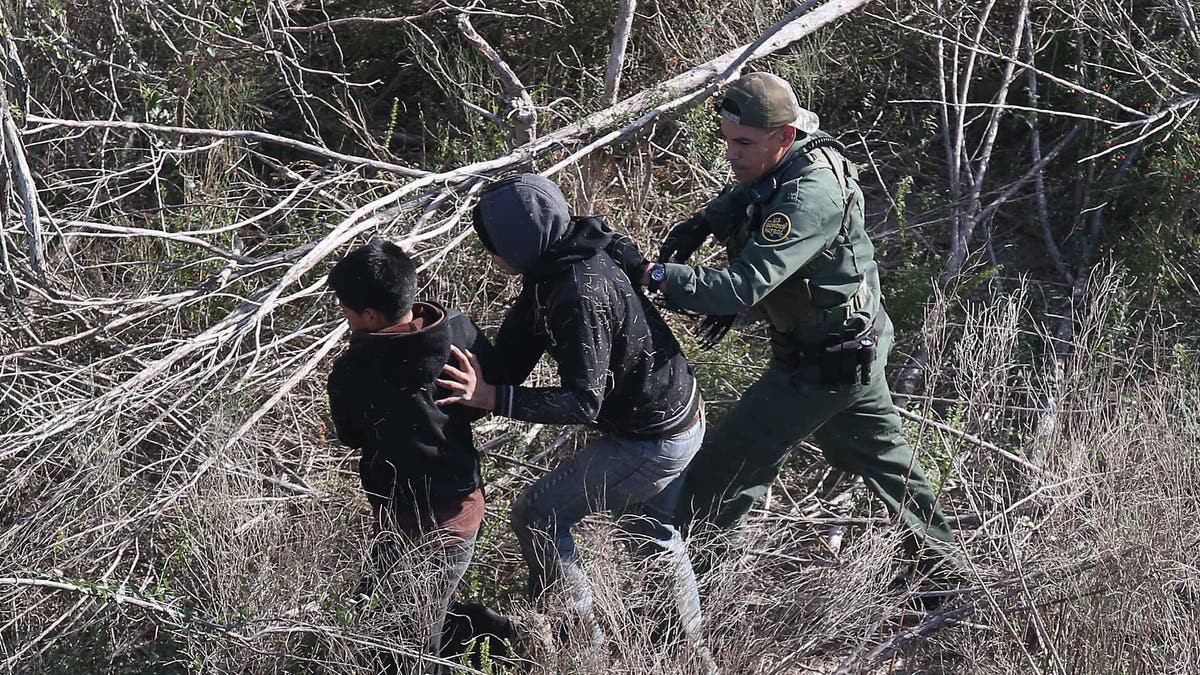
A U.S. Border Patrol agent detains juvenile undocumented immigrants on December 10, 2015 at La Grulla, Texas. (2015 Getty Images)
More than 400 unaccompanied minors who fled Central America are being settled in a rural camp in Texas, according to the Dallas Morning News.
They are part of a larger group of mostly teenagers who have gone to the U.S.-Mexico border in the last two months and approached Border Patrol agents about getting refuge in the United States.
The number of minors traveling from Central America to the border without an adult has increased after ebbing following the surge last year, U.S. authorities say.
Many youths – from Honduras, Guatemala and El Salvador -- trying to reach the United States have said they were forced to flee because of the violence in their countries.
Officials from the Honduran and Salvadoran consulates in the Dallas area plan to meet with the minors at Lakewood Camp and Retreat Center on Wednesday, the Morning News said, citing Central American officials.
Most of the youths appear to have come from Guatemala, the Morning News said.
“You could tell they were very calm,” said Gloria Alvarado, the Honduran consul in Texas.
Last week, some 60 children arrived in Texas. Most of them were boys, six were girls. In general, the minors are between the ages of 12 to 17.
“We will have access to the children, conduct visits and interviews,” said Alvarado when they arrived.
U.S. Border Patrol figures show that more than 10,000 unaccompanied children crossed into the U.S. in October and November, double the number of crossings in the same two months of last year. The increase prompted federal officials to open two shelters in Texas and one in California.
Some 1,000 children are expected to be sent to two sites in Texas and are expected to be reunited with family members who are living in the United States.
Local officials and some non-profit groups from Texas held a press conference last week to reassure the public about how the state would handle the influx of children.
Still, some in the Lone Star remain concerned. Republican Gov. Greg Abbott ordered Texas National Guard troops on Tuesday to remain at the Mexico border, extending once again a mission that began in 2014 when unaccompanied children started pouring into the country and that will now continue due to another wave of arrivals.
As many as 1,000 armed troops patrolled the Rio Grande Valley at the height of what the White House once called a "humanitarian crisis" of children showing up at the Texas border. Military officials who previously refused to publicly state an end date on the deployment said after Abbott's announcement that December was supposed to have been the end of a nearly 18-month mission.
Neither Abbott nor the Texas National Guard would say when troops would now go home. Lt. Col. Travis Walters also would not disclose how many troops would remain, but said no new troops would be deployed.
One of the Texas sites where children are being taken is a retreat center that wraps around a 30-acre lake in a wooded area.
It is run by North Texas District Assemblies of God and features a large water slide, paddle boats, a climbing wall, and sandy volleyball courts, reported the Morning News.
The other site is also a sprawling retreat center and is located in another county.
Sylvia Burwell, the head of the U.S. Health and Human Services, has told Congress that her agency will likely need more funding to afford the resources it will take to care for the children.
U.S. officials and human rights groups have said that many of the youths are trying to escape join-or-die threats from gangs, who practically run some regions in Central America.
Mexico has made some efforts to crack down on smugglers who transport the youths from Central America to their border, but those smugglers then try to find new ways to cross to the United States.
“We are talking about record high homicides levels that haven’t been seen since the civil war ended in 1992,” said Meyer, said Maureen Meyer, said Maureen Meyer, the director of the Mexico program of the Washington Office on Latin America, referring to El Salvador’s bloody war.
As for smugglers, Meyer said, “It was only a matter of time to figure out how to avoid the new checkpoints in Mexico.”
The Associated Press contributed to this report.
Like us on Facebook
